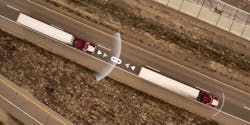Report: State laws need changing to support platooning, AVs
Among the hurdles facing the wider deployment of autonomous vehicles (AVs) as well as efforts to develop platooning strategies for cars and commercial trucks alike are what’s being called “outdated state laws,” according to a new report compiled by the Competitive Enterprise Institute (CEI) – laws that, in particular, forbid vehicles from following to close to one another.
“Right now such ‘tailgating laws,’ while they were entirely reasonable at the time they were passed, are a direct impediment to platooning and deploying self-driving vehicles,” Marc Scribner, a CEI senior fellow, explained to Fleet Owner.
Scribner also authored the group’s new report, Authorizing Automated Vehicle Platooning: A Guide for State Legislators, 2017 Edition, to provide state legislatures with guidance on how to amend their driving laws in order to allow for platooning and AV operations.
“Six states have already adopted new laws and we hope others see this report as a tool, as a starting point, to help them amend their driving rules,” he added.
The CEI report is a nationwide inventory of state “following too closely” rules that offers specific, state-by-state fixes to amend statutes in a way that exempts computer-coordinated vehicle platooning from those laws.
This report updates an earlier 2016 edition to show which states have made progress over the past year in changing laws to allow for future commercial platooning deployment.
For example, beginning this year, Arkansas, Georgia, North Carolina, South Carolina, Tennessee, and Texas have enacted exemptions, while other jurisdictions are considering similar reforms.
“Within the next few years, automated vehicle technology could reduce the cost of transporting consumer and manufacturing goods around the country if state lawmakers make small changes to their driving laws to allow platooning technology,” Scribner noted.
“Automated platooning technology is a remarkable innovation that would narrow the gap between vehicles while still allowing them to move safely at highway speeds,” he explained. “Platooning will reduce drag, fuel consumption, and traffic congestion and enhance highway safety.”
About the Author
Sean Kilcarr
Editor in Chief
Sean Kilcarr is a former longtime FleetOwner senior editor who wrote for the publication from 2000 to 2018. He served as editor-in-chief from 2017 to 2018.
